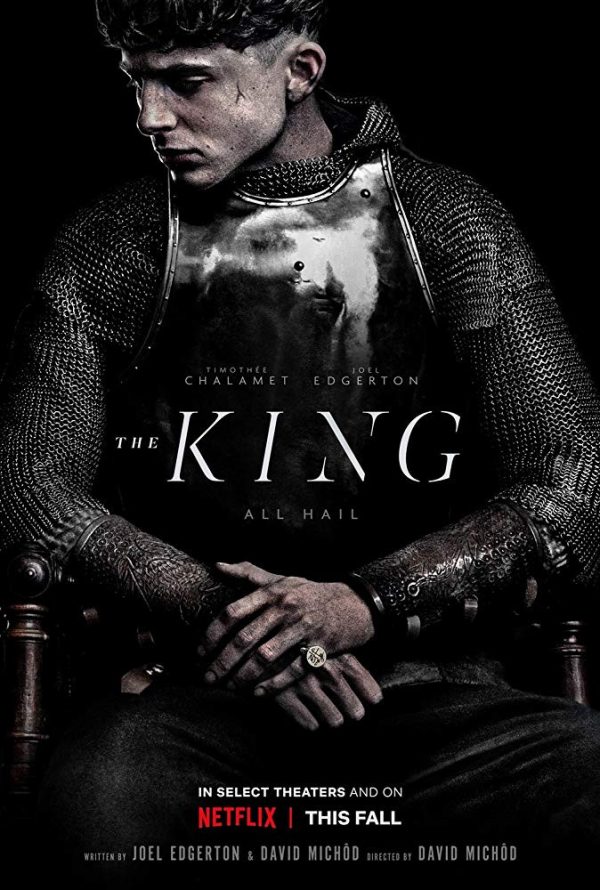The King, 2019.
Directed by David Michôd.
Starring Timothée Chalamet, Joel Edgerton, Sean Harris, Robert Pattinson, Lily-Rose Depp, Tom Glynn-Carney, Thomasin McKenzie, Dean-Charles Chapman, Edward Ashley, Thibault de Montalembert, Andrew Havill, Steven Elder, Philip Rosch, Nick Wittman, Lucas Hansen, Tom Fisher, Ivan Kaye, Tom Lawrence, and Ben Mendelsohn.
SYNOPSIS:
Hal, wayward prince and heir to the English throne, is crowned King Henry V after his tyrannical father dies. Now the young king must navigate palace politics, the war his father left behind, and the emotional strings of his past life.
While it probably isn’t entirely historically accurate, co-writer and director David Michôd’s The King sets itself apart from familiar looking medieval epics by plunging into the psychological side of Hal/King Henry V (heartthrob Timothée Chalamet, already cast against type here, also evolving with range as the character transforms) rather than the glorification of massive battles and the heroic sense of accomplishment that comes from victory. Before inheriting the crown, Prince Hal has no desire to rule England, choosing to sleep with prostitutes and regularly get wasted alongside his disgraced former knight turned honorable thief friend Sir John Falstaff (Joel Edgerton, who not only delivers a solid turn built around redemption, but also assists David Michôd in writing the script).
Hal has no intention of getting involved in political affairs, slowly getting drawn into them due to the impending death of his father King Henry IV (Ben Mendelsohn, once again effectively playing a tyrannical warlord seeking global domination) and his growing madness. He also aims to prevent his brother Thomas of Lancaster (Dean-Charles Chapman) from following the same path as their father, going so far as fighting a battle for him against his wishes. Naturally, Hal defeats the enemy (they are staged with grit and brute force with much emphasis on excellent sound design as swords and breastplates clank against each other), eliciting no pride from his actions, whereas Thomas expresses jealousy over Hal about to reap the praise and rewards he doesn’t even want. Simply put, he is looking out for his brother ensuring that he does not walk the path towards becoming a monster.
It’s not long before tragedy strikes, forcing Hal to accept royal duties as King Henry V. Promising reform, Henry vows to lead England into a peaceful period of prosperity with unity between lands, also intending to rule with civility and reason. No more wars will be started under his leadership. That is until France begins poking the hornet’s nest, so to speak, hoping for a reaction. An assortment of taunts is made, including sending an assassin all the way to King Henry V, who eventually has no choice but to retaliate and assert his strength. After all, the people don’t want a pushover for a king, either.
What ensues is somewhat of a slow burn that is wisely always fixated on the shifting mental state of King Henry V, who is consistently trying to walk a fine line between standing up for himself and his people versus slowly morphing into the father he detested and staunchly professed to never mimic. You could say it’s a generational study of sons having more in common with their fathers then they realize, but David Michôd is going one step further and showing audiences how even the most morally sound and well-intentioned kings can succumb to moral correctness and cruelty. Such a character arc really allows for Timothée Chalamet to give a layered performance and one that contains a chest-beating motivational battle preparation speech. Intense as that may be, the best exchanges simply involve him navigating a council that doesn’t see eye to eye with him, as he brings in Sir John Falstaff to watch his back and put his valuable combat knowledge to good use.
That said, The King does build to a crowd-pleasing, savagely rendered battle that is, quite literally, down and dirty. Combat armor is soaked in mud as the cinematography is claustrophobically crammed right into the thick of the violence, tracking King Henry V as he slings around his sword and wildly punches everyone in sight for survival. It’s an impressive sequence that actually benefits from its muddled chaos. Aiding the excitement is a heavy and hauntingly poetic score from Nicholas Britell, continuing to elevate the drama of every movie he composes for (last year he worked on awards contenders If Beale Street Could Talk and Vice). Additionally, the music basically feels designed to fit the ever-changing mindset of King Henry V.
The narrative as a whole is fully satisfying, hitting every emotional beat it aims for. At the same time, some of it could be condensed; The King runs 140 minutes although it easily could be chopped down to 120 if certain dialogue exchanges got to the point slightly quicker (there’s a conversation during the climax that goes on much longer than necessary). Robert Pattinson also portrays The Dauphin of France, intentionally putting on the most bizarre French accent and doing everything in his acting arsenal to not be taken seriously. It’s an interesting creative choice but feels like a wasted opportunity in terms of crafting a memorable antagonist. This is easily overlooked, as this is Timothée Chalamet’s 15th-century vehicle, and he successfully answers the call to shine outside of his comfort zone. There is a complexity to the character that goes beyond the typical genre clichés of insatiably conquering more land; it’s not easy being King, and it’s especially not easy trying to maintain one’s moral compass and integrity as King.
Flickering Myth Rating – Film: ★ ★ ★ ★ / Movie: ★ ★ ★
Robert Kojder is a member of the Chicago Film Critics Association and the Flickering Myth Reviews Editor. Check here for new reviews, friend me on Facebook, follow my Twitter or Letterboxd, check out my personal non-Flickering Myth affiliated Patreon, or email me at MetalGearSolid719@gmail.com














